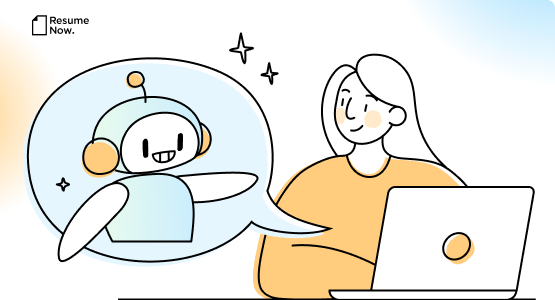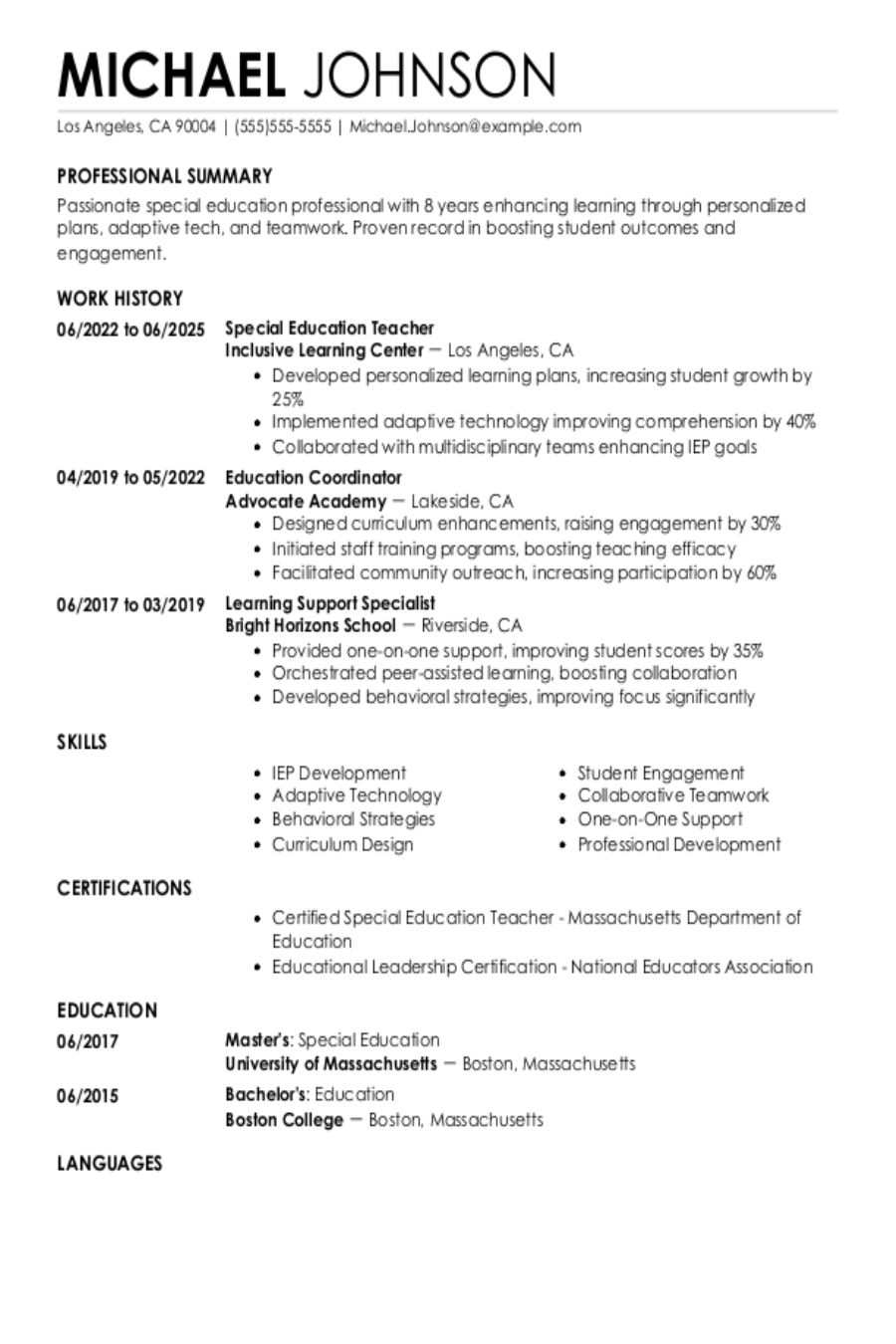Popular Engineering Resume Examples
Entry-level engineering resume
An entry-level resume for engineering should highlight relevant projects, technical skills, internships, and coursework to showcase practical knowledge and potential contributions even with limited experience.
Places skills over experience: Using the functional resume format is strategic for this entry-level engineering applicant as it highlights key skills like process optimization and project management, showcasing their ability to improve efficiency rather than just listing limited work experience.
Focuses on goals: This applicant demonstrates a strong commitment to professional development, showcasing significant achievements in engineering roles that improve efficiency and drive cost reductions while actively pursuing further skills through certifications.
Mid-career engineering resume
A mid-career engineering resume should emphasize a strong combination of technical expertise, project management experience, and continuous learning to effectively demonstrate growth and adaptability in the field.
Begins with a powerful summary: This resume's professional summary highlights essential engineering qualifications, allowing recruiters and ATS to swiftly recognize the job seeker's expertise in project management, CAD design, and process improvement.
Includes mix of skills: This resume effectively highlights a mix of technical skills, such as CAD design and automation systems, alongside strong interpersonal abilities like team leadership and project management.
Experienced engineering resume
An experienced engineering resume should highlight the applicant's key projects and technical skills, ensuring a clear representation of their professional growth and contributions to the field.
Optimized for ATS: The resume uses a clean design that pairs a professional header with an ATS-friendly resume layout, improving visibility for recruiters and ensuring effective parsing by automated systems.
Embraces modern design: This modern resume template effectively showcases the job seeker's innovative mindset, emphasizing their ability to improve efficiency and drive strong projects within the engineering sector.
No experience engineering resume
A resume for an applicant with no experience applying for an engineering role should emphasize relevant coursework, technical skills, and any projects or internships to demonstrate their potential and readiness for the industry.
Overcomes lack of work history: Emphasizing professional skills highlights the job seeker's readiness for an engineering role, demonstrating their ability to contribute effectively despite limited direct experience in the field.
Draws from diverse experiences: Including extracurricular activities and volunteer roles improves a resume by highlighting practical skills, leadership abilities, and dedication to the engineering field, especially when professional experience is limited.
Engineering Resume Template
Looking to create a standout application? This engineering resume template serves as a great foundation—simply copy and personalize it with your unique details.
Yuki Zhang
Riverview, FL 33585
(555)555-5555
Yuki.Zhang@example.com
Professional Summary
Experienced engineer specializing in process optimization and AI. Led teams and projects, delivering cost-effective solutions with impactful results.
Work History
Engineering
Tech Innovate Solutions - Riverview, FL
January 2024 - September 2025
- Optimized processes, increasing efficiency by 30%
- Led team of 10 to deliver successful projects
- Implemented AI tools, reducing costs by $50K
Mechanical Designer
Precision Engineering Corp - Tampa, FL
January 2022 - December 2023
- Design systems, improving accuracy by 25%
- Managed budgets, saving $20K annually
- Conducted tests, enhancing safety standards
Junior Engineer
GreenTech Manufacturing - Tampa, FL
January 2021 - December 2021
- Assisted in design projects, reducing errors by 15%
- Coordinated with teams, improving workflow efficiency
- Developed prototypes, enhancing product quality
Skills
- Process Optimization
- Project Management
- AI Implementation
- System Design
- Budgeting
- Safety Protocols
- Prototyping
- Workflow Coordination
Education
Master of Science Mechanical Engineering
Stanford University Stanford, California
June 2020
Bachelor of Science Mechanical Engineering
University of California, Berkeley Berkeley, California
June 2018
Certifications
- Certified Mechanical Engineer - Professional Engineers Board
- Lean Six Sigma Green Belt - International Six Sigma Institute
Languages
- Spanish - Beginner (A1)
- German - Beginner (A1)
- Mandarin - Intermediate (B1)
Writing Your Engineering Resume
Now that you've explored these exceptional resume examples, you're prepared to dive into the details of how to write a resume. We'll guide you through each section step by step.
List your most relevant skills
The skills section of your engineering resume should highlight both technical proficiencies, like software expertise or design capabilities, and essential soft skills such as teamwork and analytical thinking. This balance demonstrates your readiness to tackle the diverse challenges in engineering roles.
To make your skills section truly effective, pay close attention to the keywords from the job listing. Identify key phrases that resonate with the position and incorporate those keywords into your skills section. This strategy not only appeals to human recruiters by clearly aligning your abilities with their requirements but also optimizes your resume for applicant tracking systems, ensuring you stand out as a qualified job seeker.
Example of skills on an engineering resume
- Proficient in applying engineering principles to solve complex problems
- Experienced in using CAD software for design and modeling
- Strong communicator with the ability to collaborate effectively in teams
- Adaptable and eager to learn new technologies and methodologies
Highlighting your soft skills on your resume can set you apart from other applicants. Employers value interpersonal abilities because they are often challenging to develop, and these skills can significantly improve team dynamics and workplace culture.
Highlight your work history
Your work experience section should describe your experience and spotlight specific projects or accomplishments to differentiate yourself and clearly demonstrate the value you bring to potential employers.
Each job entry should detail your title, the employer's name, and the dates of employment. Including this information helps establish professional credibility and allows employers to quickly evaluate your background. Aim to incorporate quantifiable results where possible, as these emphasize the impact you've made in previous roles.
Example of an engineering work experience entry
- Engineering
Innovative Solutions Inc. - San Francisco, CA
June 2019 - Present - Develop and implement engineering solutions that increased product efficiency by 30%, leading to a significant reduction in operational costs
- Lead cross-functional teams in the design and execution of projects, ensuring timely delivery and adherence to budget constraints
- Use advanced modeling software to analyze system performance, resulting in a 25% improvement in quality metrics
- Mentor junior engineers, facilitating professional growth and skill enhancement, which contributed to a more cohesive team environment
- Collaborate with clients to understand their needs and provide tailored engineering solutions, achieving a 90% client satisfaction rate
Quantifying achievements in engineering is important as it provides tangible evidence of your impact. For example, stating that you led a project that reduced production costs by 15% not only highlights your effectiveness but also demonstrates your value to future employers.
Include your education
The education section of your engineering resume should list your academic credentials in reverse-chronological order starting with your most recent degree. Be sure to include degrees and relevant certifications while omitting high school diplomas if you possess a higher qualification.
If you are currently enrolled in a program or have incomplete education, indicate the highest level achieved along with an expected graduation date. For current students or recent graduates, it can be beneficial to add bullet points showcasing relevant coursework or significant academic projects.
Common certifications for an engineering resume
- Certified Engineering Technician (CET) – National Institute for Certification in Engineering Technologies (NICET)
- Project Management Professional (PMP) – Project Management Institute (PMI)
- Professional Engineer (PE) – National Council of Examiners for Engineering and Surveying (NCEES)
- Lean Six Sigma Green Belt (LSSGB) – International Association for Six Sigma Certification (IASSC)
Sum up your resume with an introduction
Creating a strong profile section in your resume is important for making a compelling first impression. This section serves as your personal introduction, showcasing your skills and experiences right at the top where hiring managers will see it immediately.
If you have substantial experience in the field, a professional summary is ideal. It allows you to highlight key accomplishments and relevant qualifications succinctly. By placing this summary at the beginning of your resume, you enable recruiters to quickly grasp what makes you a suitable job seeker based on your previous achievements and expertise. If you’re new to the workforce, you should write a resume objective that summarizes your goals and growing experience.
Professional summary example
Innovative engineer with over 10 years of experience in developing cutting-edge technologies in the renewable energy sector. Demonstrated success in leading cross-functional teams to optimize project outcomes, improve product performance, and reduce costs. Proficient in advanced modeling techniques, system design, and sustainability practices.
Resume objective example
Eager engineering graduate looking to apply analytical problem-solving and teamwork skills to support innovative projects at a forward-thinking company. Committed to leveraging strong technical knowledge and attention to detail to contribute effectively and drive successful outcomes in engineering challenges.
When crafting your resume profile, always begin with your job title. This approach helps clearly communicate your professional identity, ensuring that employers quickly understand who you are and what you bring to the table.
Add unique sections to set you apart
Improve your resume by adding optional sections that highlight your unique qualifications for engineering positions. These sections allow you to present a fuller picture of your professional self beyond just work experience.
Including relevant hobbies or volunteer experiences can reveal your values and skills in action. For example, if you've volunteered for community projects that involve engineering principles, it shows your commitment to using your expertise for good. Additionally, showcasing personal projects or interests related to engineering not only demonstrates passion but also illustrates how you continuously develop relevant skills outside the workplace.
Three sections perfect for a engineering resume
- Technical Skills: Technical skills are important on your resume as they showcase your ability to tackle engineering challenges. Highlighting these skills not only demonstrates your expertise but also helps you stand out to potential employers in a competitive job market.
- Tools and Platforms: Strong computer skills are essential in engineering. Being familiar with design software, simulation tools, and project management platforms can improve efficiency and collaboration, helping engineers innovate and solve complex problems effectively.
- Professional Certifications: Certifications showcase your dedication to professional growth in engineering. Highlight relevant certifications, the certifying body, and when you completed them to improve your credibility and career prospects.
5 Resume Formatting Tips
- Choose a format that matches your career stage.
Selecting the appropriate resume format is important based on your experience level. A chronological format effectively highlights your career progression if you have a solid work history. For individuals just starting out, a functional resume can emphasize your skills and education. If you want to present both experience and skills equally, consider using a combination format.
- Pick a smart resume template.
Using a professional resume template improves readability and keeps your formatting consistent. It allows hiring managers to easily digest your qualifications at a glance. If you choose a custom layout, ensure it remains clean and uses fonts compatible with applicant tracking systems.
- Select an appropriate font.
To improve resume clarity, opt for easily readable fonts. Consider using classic options like Helvetica, Georgia, or Verdana as a professional font choice that appeals to both applicant tracking systems and hiring managers.
- Use consistent formatting.
Align your resume text to the left and maintain uniform margins. This ensures a clean, organized look that improves readability and reflects professionalism.
- Keep your resume to one or two pages.
When crafting your resume, remember that resumes should be one page long. Keeping your information concise and relevant is essential. If you have extensive experience, a two-page resume can work, but clarity remains key. Focus on what truly matters to effectively showcase your skills.
Tools for Your Job Search
Are you gearing up to apply for that engineering role you've been eyeing? Before you hit submit, take advantage of our ATS Resume Checker. This essential tool offers insights into how effectively your resume passes through the automated systems many companies use for initial applicant screening.
Want to elevate your application even further? Our AI Resume Builder provides tailored content recommendations specific to your engineering background, along with professional templates designed to showcase your skills and projects in a compelling way.
Frequently Asked Questions
Last Updated: October 2, 2025
Absolutely. A cover letter is important as it enriches your resume by providing context and creating opportunities for communication with potential employers. It’s your moment to convey what draws you to the engineering role and demonstrate how your unique experiences can contribute to the team. So, don’t hesitate—write a cover letter that reflects your passion and qualifications.
For a quick and effective solution, consider using our AI Cover Letter Generator. This tool allows you to craft personalized, standout cover letters in minutes. Plus, you can choose from various cover letter template options that perfectly align with your resume, ensuring a professional presentation that captures attention.
A resume is typically a concise document, spanning one to two pages, focused on summarizing your skills and experiences. In contrast, a CV (curriculum vitae) can extend several pages and provides comprehensive details about your academic background, research contributions, publications, and professional experiences.
You’ll often need a CV when applying for specialized positions in academia, science, law, or medicine. If you determine that a CV is necessary for your next role, our online CV Maker can assist you in crafting a polished document quickly. Choose from our diverse range of CV templates tailored to various industries and career levels to streamline the process and improve your job application.
An engineering resume should typically be one page long, as this length is usually adequate to showcase your skills and experiences. However, if you have extensive experience or numerous projects to highlight, a two-page resume can be appropriate to provide a comprehensive view of your qualifications.
To write a strong CV, focus on creating a clear structure that showcases your strengths. Organize sections like Contact Information, Work Experience, Education, and Skills for easy navigation. It's important to choose a professional template that looks polished and is compatible with applicant tracking systems (ATS). Increase your chances of standing out by tailoring your CV with relevant keywords from job postings.
Seek out CV examples from professionals in your field for further guidance. Analyzing how they showcase their achievements can inspire ideas on effectively presenting your own qualifications and making a lasting impression on potential employers.
Many engineers begin their careers in entry-level roles, such as junior engineers or interns. Through experience and additional education or certifications, they can progress to senior engineering positions or specialized technical roles.
Was this information helpful? Let us know!
Leisha is a career industry editor dedicated to helping job seekers excel in their careers.
More resources

The AI Boss Effect: 97% of Workers Have Asked ChatGPT for Advice Instead of Their Manager
Resume Now s latest report explores how AI is replacing manage...

37 Unique Skills to Put on Your Resume
Trying to avoid the skills you see pop up on resumes repeatedl...

Resume Now Spotlights 14 High-Innovation, High-Growth Jobs That Pay $60K+
Resume Now s latest report highlights some of the highest payi...

Your Guide to Getting a Job in the Safety and Security Industry
Was this information helpful? Let us know ...



